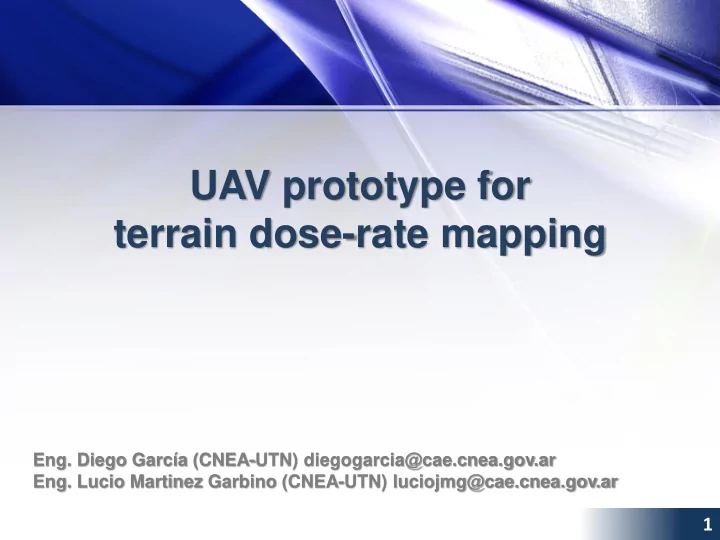

UAV prototype for terrain dose-rate mapping Eng. Diego García (CNEA-UTN) diegogarcia@cae.cnea.gov.ar Eng. Lucio Martinez Garbino (CNEA-UTN) luciojmg@cae.cnea.gov.ar 1
Origins of the project AGE CNEA-CAE requires a surface dose rate map Large measuring area (8km 2 ), requires automated process Requires periodic measurements Due to possible high dose levels prefer to reduce the exposure of people GIAR works on a project for multipurpose flying vector 2
Particular conditions Rough terrain Inaccessible areas and obstacles (perimeter fencings) Requires static measurements (depends on detector volume vs exposition time) 3
Objectives of the project Mechanicals Light Robust Measurement Count measurement with geospatial reference Detection efficiency Telemetry 4
Requirements of project Navigation Autonomy Controllability (altitude, full featured AP, secure mode, inertial NAV) Telecommand (power off of not used modules) Auxiliar systems Real time Video Link 5
Our proposal We requires a flying vehicle (UAV). But what kind? Feature Plane Helicopter Drone Balloon Weather Medium Medium Medium High sensitivity Autonomy High Medium Low Low Sturdiness Medium Low Medium High Maneuverability Medium High High Med-High Speed Med-High Low Med Low-static Landing Medium Low Low Low requirements Design Medium High Medium Low complexity 6
Main Features Sonar obstacle avoidance system Sonar altimeter AHRS system (IMU) Video link Autopilot Real time telemetry and telecommand Entirely designed and build by us. All materials available off-the-shelf Up to 6 hours autonomy Easy scalability (more Helium, more payload) Very low cost (USD 600), without detector 7
Legal, regulatory and safety ANAC (National Civil Aviation Association) (UAV, Res. Nº527/2015) Helium (instead of heated air or Hidrogen) Negative floatability Secure mode Auto Pilot (3 modes) Shut-off Return to base Secure landing 8
Other features 3D surface map Gamma Ray Spectrometry Microcontroller based for low count rate FPGA based for high count rates 9
Future Works Plastic detectors Silicon PMT High precision GNSS (Global Navigation Satellite System) Relation between measure time and weight of scintillator material and volume Background characterization Calibration Measure counts by a Scintillator (NaI(Tl)) need to convert to dose rate 10
Interface Prototype Navigation Video with Head up display Map and WP display AP panel ECAM panel (Electronic Centralised Nav sonar Aircraft Monitor) Emergency settings Power control, Count, battery state, spectrum ammeter, and alarm autonomy Log Warnings and alarms panel 11
Vehicle Prototype NAV, Strobe, Lipo battery ATTR lights pack and balancer 2 vectored motors Carbon fiber structure NAV sonar Electronics Video cammera Detector 12
UAV prototype for terrain dose-rate mapping Eng. Diego García (CNEA-UTN) diegogarcia@cae.cnea.gov.ar Eng. Lucio Martinez Garbino (CNEA-UTN) luciojmg@cae.cnea.gov.ar 13
Recommend
More recommend